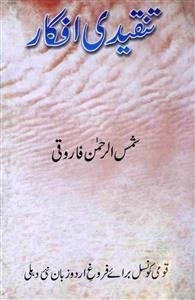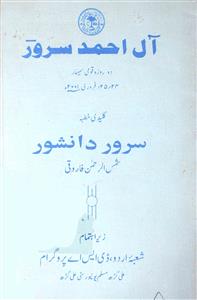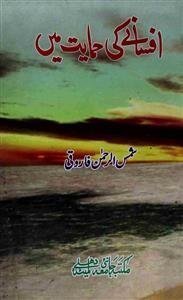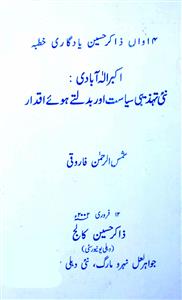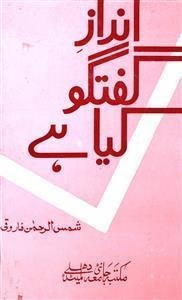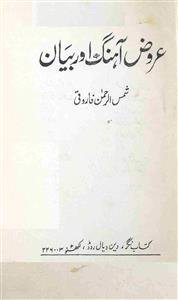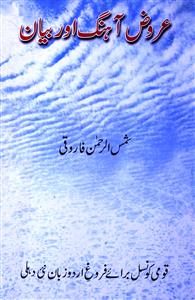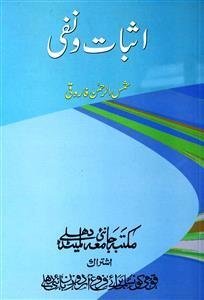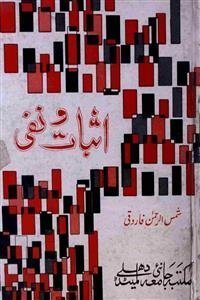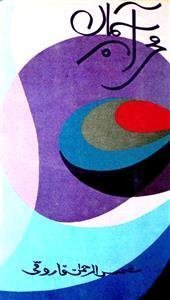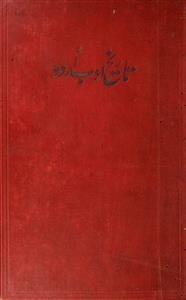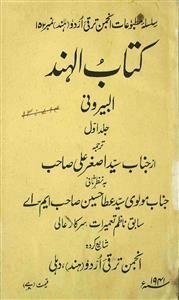 For any query/comment related to this ebook, please contact us at haidar.ali@rekhta.org
For any query/comment related to this ebook, please contact us at haidar.ali@rekhta.org
About The Book
شمس الرحمن فاروقی کی تصانیف علمی وادبی اعتبار سے بنیادی حوالوں کی حیثیت رکھتی ہیں۔ان کی کہی بات بطور حوالہ مستند مانی جاتی ہے۔انھوں نے نہ صرف اردو شعریات کے خد وخال کو نمایاں کیا ہے بلکہ مغربی ادب کے علاوہ عربی ، فارسی اور سنسکرت کے فکری و ادبی سرمائے سے استفادہ کرتے ہوئے اردو کی لسانی ،تہذیبی اور ادبی تونگری میں اضافہ کیا ہے۔ شمس الرحمن فاروقی کی یہ تصنیف"تنقیدی افکار"بھی ادب کے متفرق اصناف سے متعلق مختلف تنقیدی موضوعات کا احاطہ کرتی اہمیت کی حامل ہے۔جس میں جدید شعری جمالیات ،ارسطو کا نظریائی ادب ،"ہماری شاعری "پرایک نظر۔ ادبی تخلیق اور ادبی تنقید، ،اردو لغات اور لغت نگاری وغیرہ جیسے مختلف ادبی موضوعات پر فاروقی صاحب کے پر مغز مضامین شامل ہیں ۔ ان موضوعات کو سمجھنے میں فاروقی صاحب کی تنقیدی آرا معاون ہے۔گو یہ مضامین مشکل ہیں لیکن فاروقی صاحب نے ان موضوعات پر مختلف حوالوں اور دلائل کے ساتھ سیر حاصل گفتگو کی ہے جس سے قارئین بہتر طور سے ان موضوعات کوسمجھ سکتےہیں۔چونکہ کتاب میں شامل سبھی مضامین تنقیدی نظریہ کے حامل ہیں۔جس سے فاروقی صاحب کا تنقیدی نقطہ نظر بھی واضح ہوجاتا ہے۔
About The Author
Shamsur Rahman Farooqi was the eldest among seven brothers and the third of thirteen siblings. He had an innate penchant for reading. His grandfather, Hakeem Maulvi Mohammad Asghar Farooqi was associated with the field of education and was the teacher of poet Firaq Gorakhpuri. Muhammad Nazir, Farooqi’s maternal grandfather, also set up a small school which has now been converted into a college.
He started his literary life with poetry in his school days. At the age of seven, he wrote a hemistich, "Malum Kya Kisi Ko Mera Haal-e-Zaar hai.” But for ages, could not append another hemistich to it. Noticing his very first couplet not coming off, he renounced poetry and started compiling and publishing a handwritten magazine ‘Gulistan’. Not much of a journal, it was actually a humble collection of 16–25-page cut-outs with his own writings on them. When the journal came to his father’s knowledge, he pointed out to that Farooqi had written some couplets out of meter, and rectified the corrections by explaining the scansion to him. He so liked the phonetic repetition of metrical feet in the verse, that he at once decided to become a prosodist in the future. After matriculation, he started writing fiction, but neither did he remembered the name of the first short-story, nor the journal in which it was published. In 1949-50, he wrote a novel, "Daldal Ke Baahar”, which was serially published in the journal ‘Meyar’, Meerut, in four parts. Consequently, Farooqi took to prose, as his chief medium of expression.
Farooqi Sahib was born on September 30, 1935, in Pratapgarh district, which was his maternal home. After matriculating from his hometown Azamgarh, and graduating from Gorakhpur, he entered Allahabad University. In Allahabad, he lived with a closed one, whose home was several miles away. He often travelled on foot and would walk while reading and turning the pages of some book almost inevitably. Since it was a different era altogether, wayfarers, seeing how engrossed he was in reading, would themselves give way to him.
He did his MA in English from Allahabad University and earned the first position in the university. When his picture was published in the English daily Amrit Bazar Patrika, all his family members were proud of it. During this time, he met his classmate Jamila Khatun Hashmi who was very impressed with his intelligence. She later became the daughter-in-law of the family by the name of Jamila Farooqi. After MA, Farooqi became involved in the field of teaching but at the same time continued to prepare for competitive examinations. He passed this examination in 1957 and was selected for the Postal Service. Since then, he has been posted in various cities in India and has had many opportunities to travel abroad.
At the same time, critical essays and translations of Shams-ur-Rehman Farooqi began to be published, which attracted the literary world. This was a time when the progressive literary movement was gaining momentum. Progressive writers began to consider Farooqi Sahib as their opponent considering him a supporter of modernism and literature for the sake of literature. But Farooqi Sahib remained steadfast on his front. His erudition and expanse of the study was astonishing, his analytical and synthetic qualities created a unique way of reasoning in his critiques, something which also impressed his rivals.
In June 1966, Shamsur Rehman Farooqi founded a literary magazine, Shab Khoon. Although his name was not published as the editor of this magazine, the whole literary world knew that he was its soul and vitality. The first issue of Shab Khoon had the names of Dr. Syed Ijaz Hussain as the editor, Jafar Raza as the deputy editor, and Jamila Farooqi, the wife of Shams-ur-Rehman Farooqi as the compiler and supervisor. Shab Khoon was declared the forerunner of modernism in Urdu literature and inspired over two generations of Urdu writers. Shab Khoon continually published for 39 years. The last issue of Shab Khoon was published in June 2005 in two volumes which included the best inclusions from previous issues of Shab Khoon.
Numerous collections of critical essays by Shamsur Rahman Farooqi have been published including, Naye Naam; Lafz-o-Mani; Farooqi ke Tabsire; Sher, Ghair-Sher, aur Nasr; Uruz, Ahang, aur Bayan; Tanqidi Afkar; Isbat-o-Nafi; Andaz-e-Guftugu Kya Hai; Ghalib Par Char Tahreeren’ Urdu Ghazal Ke Aham Mod; Khurshid Ka Saman-e-Safar; Hamare Liye Manto Sahib; Urdu Ka Ibtidai Zamana, among others. However, his most important work of criticism is considered to be ‘Sher-e-Shor-Angez’. There is no precedent in Urdu literature for how Mir Taqi Mir’s poetry is elucidated in this four-volume book. He also received the Saraswati Saman Literary Award in 1996 for this book. Farooqi also re-translated Aristotle's ‘Poetics’, and wrote a compelling preface for the same.
Around 1980, Shamsur Rahman Farooqi became associated with the Taraqqi Urdu Bureau for some time. This affiliation breathed new life into the institution. During his tenure, the institute not only republished classical Urdu literature and dictionaries but also published many new books. A gazette of this organization also started to be published under the name of ‘Urdu Duniya’ which brought the scattered tracts of Urdu book readers closer.
Farooqi Saheb’s poetry, too, made the scene from time to time, with several collections published, including Ganj-e-Sokhta, Sabz Andar Sabz, Char Samt Ka Dariya, and Asmaan Mihrab. His collected works of poetry (Kulliyat), published under the name, ‘Majlis-e-Afaq Mein Parwana Saa.n’. Farooqi Sahib was also very interested in lexicography. His interest in this field is reflected in the dictionary ‘Lughat-e-Roz-Marra’, of which several editions have been published. But Farooqi's most dynamic work was that in the field of Dastan and Afsana when he started to work on the epic ‘Dastan-e-Amir Hamza’. He read about fifty volumes of Dastan Amir Hamza word for word and then came up with his magnum opus, ‘Sahiri Shahi, Sahib Qirani’: Dastan-e-Amir Hamza Ka Mutalia’. In the 1990s, Farooqi wrote a series of short-stories under various pseudonyms that became very popular. Apart from Shab Khoon, these writings were also published in the Pakistani magazine ‘Aaj’. Later, a collection of these works was published under the title ‘Sawar Aur Dusre Afsane’. It was then that people came to know that these were written by Farooqi. This collection inspired Farooqi to write a novel on the backdrop of the Mughal history of India. This novel was published under the title "Kai Chand the Sar-e-Aasman". Interestingly, the novel was first published in 2006 in Pakistan and then in India. The novel became a classic as soon as it was published. It was well-received by all the major Urdu fiction writers, critics, and readers, which can be guessed from the publication of several editions and translations of this novel. Famous Indian actor, Irfan Khan wanted to adapt this novel to a film. Farooqi Sahib had permitted him to do so but unfortunately, Irfan Khan also passed away before Farooqi Sahib.
Shamsur Rahman Farooqi was awarded the Padma Shri by the Government of India in 2009 and Sitara-e-Imtiaz by the Government of Pakistan in 2010. He was also conferred the honorary degree of D.Litt by Aligarh Muslim University while he was also awarded the Sahitya Akademi Award for his book ‘Tanqidi Afkar’.
Note: This article is written by renowned researcher Aqeel Abbas Jafari on the death of Farooqi Sahib.
 For any query/comment related to this ebook, please contact us at haidar.ali@rekhta.org
For any query/comment related to this ebook, please contact us at haidar.ali@rekhta.org
